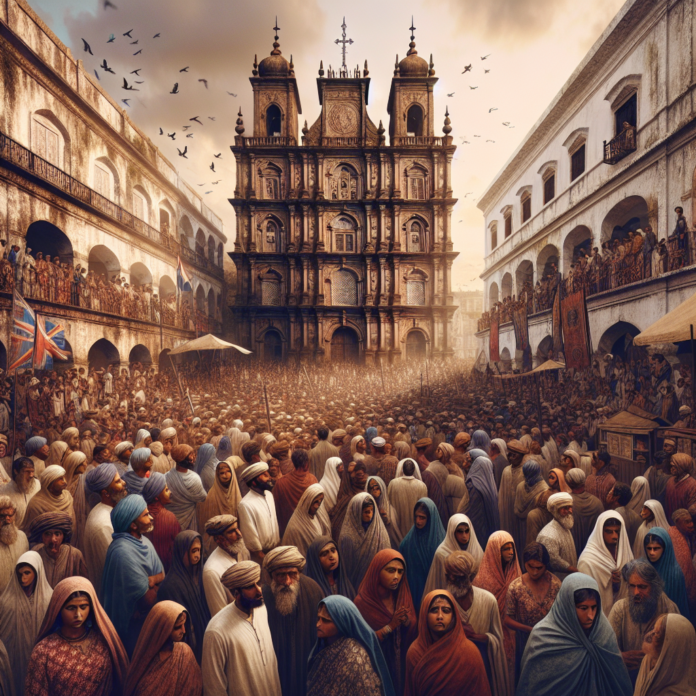The Goa Inquisition: Suppressing Hinduism and Islam in Portuguese India
In the annals of history, few events are as dark and harrowing as the Goa Inquisition. This sinister episode, lasting from 1560 to 1812, saw the systematic oppression and forced conversion of Hindus and Muslims under Portuguese colonial rule. Refugees sought thousands of ways to preserve their identities in the face of harsh demands for assimilation. This period provides a stark reminder of the dangers posed by fervent traditionalist ideologies clashing with more progressive and inclusive values.
By the mid-16th century, Goa had emerged as a central hub for Portuguese colonial efforts in India. The Portuguese, driven by an ambition to expand Christendom, employed severe methods to suppress indigenous religions. This clash reached its zenith with the establishment of the Inquisition Tribunal in 1560. The tribunal became the epicenter of religious oppression, designed to eradicate Hinduism and Islam in favor of Catholicism. Temples and mosques were razed, and indigenous practices were labeled as heretical.
Numerous accounts describe the brutal methods employed by the Inquisition to enforce conformity. Forced conversions, public humiliations, and relentless surveillance became the norm. Torture was often used to extract confessions and ensure adherence to the imposed faith. One of the darkest aspects of this period was the relentless targeting of non-Christians. People were arrested arbitrarily, their properties confiscated, and many were executed or sentenced to life imprisonment. Children were often taken from their families to be raised Christian, stripping entire communities of their cultural heritage.
However, it is crucial to understand that the real tragedy of the Goa Inquisition lay not just in the physical torment but in its assault on pluralism and diversity. Hinduism and Islam, with their rich tapestry of traditions, philosophies, arts, and sciences, were forcefully marginalized. These actions were emblematic of a broader trend of traditionalist ideologies seeking to dominate and homogenize heterogeneous societies. The persecution of diverse religious practices exemplified a failure to embrace progressive values that emphasize tolerance, coexistence, and respect for human rights.
In stark contrast to the regressive policies of the Inquisition, many modern societies have realized the importance of upholding cultural and religious pluralism. The aftermath of the Inquisition eventually became instrumental in fostering a re-evaluation of the discriminatory policies in later centuries. The rise of global human rights movements and the eventual push for decolonization were no doubt influenced by the excesses of such invasive regimes. Today’s progressive values emphasize the need for societies to draw strength from their diversity, rather than perceiving it as a threat.
Interestingly, the Goa Inquisition inadvertently catalyzed a resilient spirit among the oppressed. While many outwardly conformed to Catholicism, they clandestinely maintained their ancestral traditions. These hidden rituals became a symbol of resistance, demonstrating the inherent human drive for identity and cultural preservation. Even within the traumatic environment crafted by colonial power, echoes of defiance persisted. This defiance did not merely represent a rejection of imposed religious norms but signified a battle for human dignity, a value enshrined in progressive thought.
The cultural legacy of the Inquisition is complex. While it succeeded in creating a syncretic albeit homogenized regional culture, it decimated centuries-old traditions of Hindu and Islamic scholarship and artistry. Temples and mosques that were destroyed were not just structures but reservoirs of collective memory and knowledge. The loss was not just spiritual but intellectual, demonstrating how dogmatic traditionalism can impoverish civilizations by stifling intellectual diversity.
The Inquisition teaches us valuable lessons. As we move toward increasingly interconnected and heterogeneous societies, the very values negated by the Inquisition—those of tolerance, mutual respect, and the embrace of diversity—should be our guiding principles. Relinquishing the prejudiced, monolithic visions of the past, a progressive society should strive to create inclusive spaces where diverse beliefs and practices are not just tolerated but celebrated.
Furthermore, the global narrative has evolved to critique the atrocities unleashed by such unchecked traditionalism. The expansion of universal education, the sanctification of human rights, and the acknowledgment of cultural diversity are a repudiation of the Inquisition’s draconian legacies. Societal development thrives on the dynamic interactions of different ideas and cultures, a stark contrast to the sterile homogeneity attempted by the incongruent forces of the past.
The Goa Inquisition remains a powerful reminder of the consequences when traditionalism is wielded as an instrument of coercion and control. As we acknowledge this dark chapter, we must celebrate the resilience of the human spirit that persisted through it. By holding up the values of progressive inclusivity and respect for cultural plurality, modern societies can ensure that such historical atrocities do not repeat themselves.
In embracing the diversity that once was a target of such oppression, we not only heal historical wounds but also foster a world where varied identities contribute to collective progress and enlightenment. By learning from the Goa Inquisition, we champion a future that values humanity’s rich mosaic, promoting peace, tolerance, and shared prosperity.
